50 years on from Derry’s first All-Ireland minor football title, and as the county prepares to celebrate the anniversary, Seamus McRory looks back at a pivotal year for Derry football, recalling his personal memories of the events of 1965 and the men who laid a path for future generations.
*****
ON THE LAST MONDAY IN September 1965, three young students awoke from their slumber and happily looked forward to their morning lectures – not necessarily just because of the innate quality of the lectures themselves but more in salutation and joyous exultation at the wonderful outcome of the All- Ireland Minor football final in Croke Park the previous afternoon. This had been the magnificent culmination of a momentous six months in the annals of Derry Gaelic football. It was now appropriate that their heroes should be personally welcomed home to their native county in a manner befitting both the occasion and their collective feelings of unadulterated joy.
*****
The phenomenal achievement of the previously unheralded St Columb’s College of Derry City in both the Ulster Colleges’ MacRory and Hogan Cups competitions of that season had made front page headlines on a continuous basis throughout the year. Playing controlled, methodical, combination football with an exceptional degree of sublime skill and consummate artistry, completely belying their tender years, they literally blitzed their way, first of all, to win the blue riband of Ulster Colleges’ football – the MacRory Cup. Abbey CBS Newry, St Macartan’s Monaghan and St Michaels Enniskillen were all well beaten on the journey to their first provincial title. In the Hogan Cup semi – final a powerful display by centre half back Malachy McAfee and a truly scintillating performance by left half forward and future soccer star Tony O’Doherty were the highlights of a superb team performance and subsequent four- point victory over one of the traditional kingpins of Colleges’ football ,St Jarlath’s College of Tuam.
The Hogan final with Belcamp OMI of Dublin was a tense, close affair and only tremendous tackling by the St Columb’s defenders, especially in the last quarter, allowed the Derry men to obtain a draw. There is no doubt that Belcamp deserved their late equalising point which was punched over the bar by future Kilkenny All Star hurler Frank Cummins. In the replay 8,000 spectators witnessed a game of really exciting football, laced with some brilliant individual performances on both sides. In a suspense – filled and exciting finish St Columb’s held out to emerge deserving winners by one point. Kilrea’s Paddy McCotter had the signal honour of captaining Derry’s first All – Ireland football championship winners at any level.
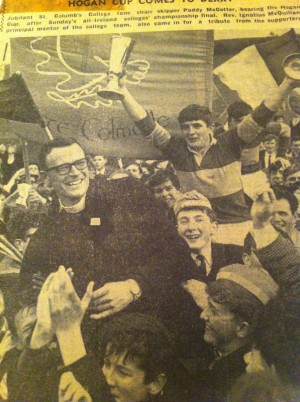
When one recalls that fantastic achievement, by a group of extremely talented players, one must also give due praise to team manager Fr Ignatius Mc Quillan, assistant manager and Kerry native Sean Moynihan, Raymond Gallagher who as well as being a teacher at the College was a member of Derry County GAA board, former Cavan great Charlie Gallagher who was a dentist in the city, Fr Paddy Regan and Dermot McDermott. Indeed it was thanks to Fr Ignatius’ foresight that the College decided to enter Ulster Colleges’ competitions, four years earlier in 1961.Under his expert guidance College sides were successful in both the Corn na nOg and Rannafast Cup underage competitions. When they reached the semi – final of the MacRory Cup in 1964 Fr McQuillan, knowing that eight of those players would be eligible for the following year’s premier competition, left no stone unturned in his meticulous preparation .Thus he assembled the above backroom team – a group of men of the utmost ability, who also possessed a winning mentality, to assist him in his task. Incidentally Fr McQuillan had created his own individual bit of history when under the pseudonym “Sean Maguire” he played full back and was Captain of the Fermanagh team which won the 1959 All Ireland Junior football final.( Priests were not officially allowed to play County football at this time. Adopting another name was how the imaginative, bespectacled priest circumvented the issue!)
What made those three students and all Derry GAA aficionados so enthusiastic during the summer of 1965 was the fact that eight of that St Columb’s successful panel were available for the Derry Minor team.16 Year old Colum P Mullan and Tom Quinn were intelligent and skilful defenders whose versatility enabled them to play comfortably in a variety of positions. (The very accomplished Quinn played at midfield and was team captain when St Columb’s retained the MacRory Cup in 1966 by defeating St Patrick’s High School Downpatrick in the final. Seven others of the 1965 panel joined him on that back to back MacRory winning team. They were Michael P Kelly, Kieran McEldowney, Colum Mullan, Phil Friel Brendan Mullan, Tony O’Doherty and Pat McGonagle.) Michael P Kelly was a tenacious no nonsense corner back and Malachy McAfee was a colossus at centre half back who had completely blotted out prospective Senior Galway star, Jimmy Duggan, in the Hogan Cup semi-final. Seamus Lagan was a great high fielder, equally at home in defence, at midfield or in the forward line. Chris Brown and Brendan Mullan were very lively, skilful and dangerous attackers and substitute Philip Friel, from the Sarsfield club in Derry City, was starting to show great promise as the campaign progressed. (The versatile Friel was also a hurler of note and once won a poc fada competition.) Regrettably excellent fielders and very supportive team colleagues, full back Brendan Dolan and midfielder Harry McGill, were Tyrone natives and the tigerish, speedster Peter Stevenson and team Captain Paddy McCotter, amongst others, were victims of the age differential between Mac Rory Cup eligibility and County Minor age.
Enlarge
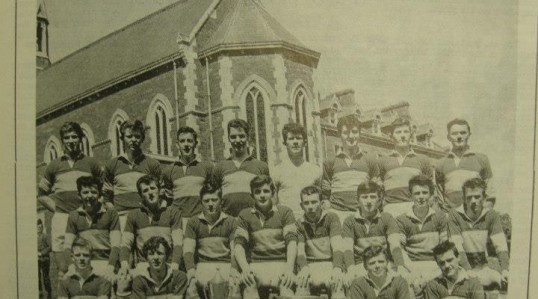
(Tragically Brendan Dolan – whose brother Fr Andy Dolan is currently Parish Priest of Bellaghy – was killed on his way to work in January 1973. A regular first team player for Tyrone he had just received word that he had been selected on that year’s Ulster Railway Cup squad. Sadly, too, his former College teammate and then a prominent Derry Senior player Colum P Mullan was seriously injured, also in a car crash, coming from Brendan’s funeral. Colum P was unfortunately unable to play football again as a result but became very active as a team mentor with his native Ballerin).
Sprightly goalkeeper Joe Cassidy and the gifted Tony O’Doherty were also star soccer players and owing to the existence of the ban then on “foreign games,” they were not allowed to play Gaelic games at either club or County level. Thanks to Fr McQuillan’s rather convincing legal pleadings the GAA did not pursue the eligibility or otherwise of Cassidy, O’Doherty or another future Irish League soccer star Brendan Mullan, destined to score two goals in a FA cup tie for Fulham, participating in Colleges’ GAA affairs.(By 1971 the GAA had adopted a more hard line stance when Antrim County Board refused to allow the MacRory Cup semi – final, between two Belfast schools St Malachy’s and St Mary’, to be played in Casement Park. Instead the game was played on private grounds, at Omagh CBS. This County Board decision had necessitated an unnecessary round trip of 140 miles for the two Belfast schools and their supporters. The reason for this was that St Malachy’s best player and former Derry Minor Martin O’Neill was a registered Irish League soccer player with Distillery. Ironically the GAA ‘s infamous Ban Rule 27 which Antrim said O’Neill was in breach of was removed at the Annual GAA Congress which was held in Belfast six weeks later. No one was more annoyed with this venue switch than St Malachy’s manager Phil Stuart from Ballinderry who had partnered Jim McKeever, at midfield, in the 1958 All Ireland final between Derry and Dublin.)

Still, despite all these notable absentees, knowledgeable Derry GAA football people reckoned that we had a nucleus of a good county Minor side. When Derry reached the Ulster Minor league final without the College players that positive mentality was certainly reinforced. Under the stewardship of one of the all-time greats of Derry football, Sean O’Connell, a series of trials had been arranged throughout the county and after careful screening a panel of thirty was established and they formed the basis of the team which had beaten Tyrone, Donegal and Fermanagh before losing the League final to Down.
In the first round of the Ulster Championship Derry, with the St Columb’s players now back on board, easily accounted for Donegal but the victory was tarnished somewhat by an injury to Chris Brown who later had to undergo a cartilage operation. As a result the unfortunate Bellaghy clubman would not play an active role in the rest of the campaign. In the provincial semi – final they scored a deserved but narrow one-point victory over Down. Again injury struck when ace forward Philip Friel had three ribs fractured. However, he was luckier than Chris as he was able to feature prominently in the later stages of the championship. In the Ulster final the whole side played superbly as they convincingly defeated Cavan by a ten-point winning margin. One of the main mentors behind the team was Fr Seamus Shields. The Desertmartin native who would become a legendary figure In Swatragh Co-operative Enterprises was clearly impressed when he spoke at the victory celebrations in the immediate aftermath of the Ulster title success.
'Co-operation is the secret of success. Co-operation can move mountains. Yes - it can even win an All-Ireland title.'
With that positive outlook the die was now surely cast for All – Ireland glory. Both the County board and the team management planned accordingly. Most importantly the players trained assiduously and focused totally on what had to be done if the ultimate prize was to be garnered. The All Ireland semi -final, against Connacht champions Roscommon, was an eight-goal thriller played at a breath-taking pace with a fantastic level of skill permeating throughout this totally, absorbing contest. Making his Croke Park debut on the Roscommon side was subsequent all-time great, the late and much lamented Dermot Earley. Though Roscommon were a much taller and the more physically stronger team, it was the dazzling speed, excellent teamwork and superior skill of the Oak Leaf boys which gradually became the decisive factor. True, Derry had a disastrous start when their defence conceded two goals, but magnificent work by Mickey Niblock and Seamus McCloskey in the central forward positions allowed Derry to claw back the deficit and actually go in at half time leading narrowly on an unusual 3-3 to 3-2 score line.
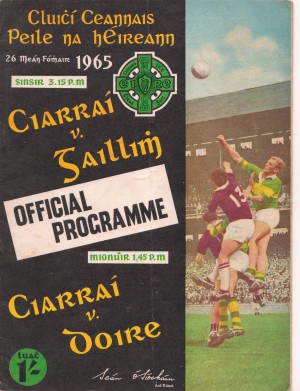
I will never forget Derry’s stupendous second half display. The defence were simply magnificent, the midfield became dominant and the whole forward line were, with Brendan Mullan and Eamonn Coleman wreaking havoc with their penetrating runs, simply outstanding both individually and collectively. Despite a last minute goal by Roscommon, Derry comfortably secured victory on a 4-8 to 4-5 score line. Now they were in the All-Ireland final against a Kerry side who had played very well to overcome Leinster champions Offaly in the other semi – final.
“Would the immense potential of Derry be realised or would the combination of tradition-steeped Kerry and Croke Park inhibit their skills? That Derry had the intrinsic ability to win was not questioned. It was a matter of whether they could produce the magic on the big day and the great occasion.”
Those words were published in 1984 in “The History of The GAA in Derry” and written by one of the most talented players on that side, the late Colum P Mullan. In essence they accurately summed up the exact feelings of all GAA followers.
As many of the team were now back as boarders in St Columb’s the training sessions were divided into two sections. Sean O’Connell prepared the non St Columb’s players in Ballinascreen and Father McQuillan prepared the College players at the College itself. After intensive, separate, physical preparations all players were brought together at weekends to discuss thorough match- day strategies against their Kerry opponents. After much deliberation the selectors picked the team which showed two changes from the semi- final line out. Into goal came Eugene McCaul from Foreglen and the fully recovered Phil Friel was recalled to the forward line.
On the last Sunday in September the Oak Leaf boys started the final rather nervously, with many of their normally more prominent outfield players not playing to their full potential initially. As a consequence their defence was under sustained pressure for much of the first half. It took three outstanding saves by their new goalkeeper to keep the Kerry side from surging ahead by a comfortable margin. However, thanks to McCaul’s brilliance and tremendous defending by his defensive colleagues the Munster men only led by a point when the sides retired at the interval.
Sensing how composed the side were becoming towards the end of that first half manager Sean O’Connell instinctively knew that his team were well capable of recording a historic victory if they played their normal skill-based, combination football in the second half. So that hypothesis formed the central theme of his half-time pep talk. Immediately on the resumption the whole Derry side were a completely transformed unit. Colum P Mullan recalled some of the national press comments on that third quarter.
“Within a minute, they were on level terms; within four they had taken a lead which they skilfully and systematically built up to an intimidating six points by the turn of the last quarter.”
That second half display was in direct contrast to the hesitancy in the tackle and the lack of confidence shown in general play, especially in the first twenty minutes of the game. The whole side were showing an uncanny fighting spirit and sheer determination as they constantly moved forward in attacking formations. No one typified this dramatic change more than flame – haired corner forward Philip Friel. In the words of ace radio commentator Michéal O’Muircheartaigh, in his Radio Éireann report after the match, this second half will always be remembered for the inventiveness and sheer class of the Derry City player as he literally ran riot, setting alight the Derry attack scoring one goal and engineering many of the other scores. Kerry briefly rallied when the Derry defence untypically conceded a soft goal. However and immediately, normal service was resumed when in a sweeping up – field movement Derry attacked in numbers and once again the elusive Philip Friel set up full forward Seamus McCloskey who sent to the net for a great goal. When the referee, Jimmy Hatton of Wicklow, blew the full time whistle Derry had won on a score line of 2-8 to 2-4.
The whole stands erupted in a spontaneous gesture to the magnificence of a brilliant Derry side which had won the All – Ireland Minor title for the first time. Hundreds of Derry spectators swarmed onto the luscious green sward of Croke Park to cheer and congratulate their heroes. When the Cup was presented to team captain Tommy Diamond, mentors and supporters chaired Tommy and his fellow players from the field in a spontaneous gesture of unbridled emotion.
The entire team were really superb in a wonderful display of skill, team work and true grit. The defensive sextet of Anthony Burke, Tom Quinn, Michael P Kelly, Colum P Mullan, Malachy McAfee and another 16 year old, Adrian McGuckin, were coolness and competency personified. Behind them goalkeeper Eugen McCaul’s first half saves alone really ensured that the Tom Markham Cup was destined for the Oak Leaf County. Seamus Lagan had an outstanding game at centre field. He and his midfield partner Tommy Diamond were always alert to both supporting their defenders when required and to supplying a tremendous amount of good ball to a very eager and enterprising forward line. The exquisite quality and combination play of Brendan Mullan, Mickey Niblock, Eamonn Coleman, John Joe Kearney, Seamus McCloskey and Philip Friel made this a day to remember for all of us who were privileged to be there. I am sure the other five will forgive me if I make special reference to the ingenuity and pure class of Phil Friel’s wonder performance. In my mind’s eye I can still see this (until then!) virtually unknown young man bamboozling and mesmerising the whole Kerry full back line with his tantalising play.
Sean McElwee of Desertmartin, Tony O’Neill of Cookstown and Yours Truly from Lissan unsuccessfully spent the whole morning of September 27th 1965 trying to obtain a lift to the homecoming celebrations, for the victorious Derry team, later that night in Maghera – the then accepted capital of Derry GAA. By lunch time it was decided to solve our problem by taking the unprecedented step, for three poor students, of hiring out a car for the occasion! Being the only holder, amongst us, of a driving licence and showing initiative and leadership qualities which would later serve him so well for many years in a working capacity in Maghera, Sean organised the pooling of our limited financial resources and he hired out a sparkling brand new Morris Minor for the journey of a lifetime.
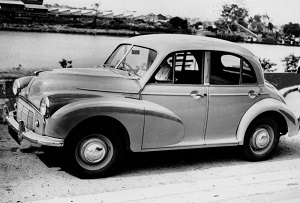
We will never forget the mounting excitement as we made our way through Antrim and Randalstown before crossing into our beloved Derry at Toomebridge. Both driver and car gathered speed before we arrived at Hillhead, our last major road sign on the way to the capital of our new world. On the last remaining four miles we encountered a cavalcade of cars packed with delirious passengers waving scarves and flags in the autumn evening. Maghera was crammed with cheering Derry fans when we arrived, just ahead of the players. They were driven on the back of a lorry owned by a John Mulholland. The lorry was escorted by Brackareilly Accordion band which played “Roddy McCorley,” “The Boys of Wexford” and other rousing marching tunes as it edged its way slowly towards the centre of the town. The lorry was splendidly and colourfully decorated with bunting and flags in the Derry colours. As the County Board chairman, Tommy Mellon, officially welcomed home the newly – crowned All – Ireland champions a communal deafening noise of happiness rent the night air. One memory above all others is forever etched in my mind in that scene of joy. During all the cheering and speeches one of the Derry players continually danced up and down on the platform with sheer excitement. He had the most bronzed visage and was the smallest player on the team. I think it is not entirely coincidental that that player was the one and only, but sadly departed, Eamonn Coleman who 28 years later would lead Derry football to the greatest prize of all.
After the initial speeches of welcome, everyone adjourned into the nearby National Hall for a monster, celebratory Céilí. In my young adulthood innocence I had at that time definitely thought, with the exception of female siblings and close relations, that supporting Gaelic games or indeed any other major field sports was the sole preserve of the male population .When I saw the hall crammed with so many of our female brethren I initially did not understand. Then it suddenly dawned on me that an unannounced, social revolution was quietly, slowly, evolving. At this period in the county there was a powerful tradition of Céilí dancing, especially in South Derry. These Céilís were held on a weekly basis in several parishes, mainly in the greater, rural catchment areas around Maghera and Magherafelt. In those days there was a GAA ban on “foreign dances” as well as “foreign games” although there was often a diplomatic blind eye turned to the former by many units of the Association, especially for club fundraising events. Be that as it may it must be said that there was a real, enthusiastic interest in the county at this time in promoting Céilí dancing and huge crowds of both males and females regularly turned up to support them. The presence of our victorious Minor team had simply moved the revolution onto the next stage of gender interaction. Now a successful Derry football team had the catalytic effect of blending all lovers of our native music and dance, irrespective of gender and individual interest, and all GAA supporters into a cultural tight – knit community. We were all now, though unconsciously, united in pursuit of the totality of our Irish heritage. This was the first positive impact, albeit a sporting, female – emancipation one, of Derry’s historic success.
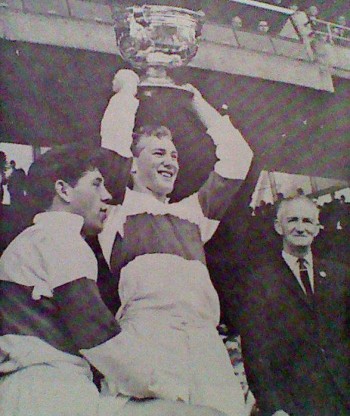
That Monday night was an opportunity to showcase all that was best in Irish dancing and Irish music. It must be said that the organisers, musicians and dancers all rose magnificently to the occasion. Several expert mentors, both male and female, who were regular Céilí goers, helped those of us who were less initiated in the finer steps and nuances of the various dances. Our chauffeur Sean was one such expert as was another fellow student from Newbridge Maura Diamond (sister of impending County and Ulster full back Henry). Thanks to the promptings of them and others, by the end of the night all of us lesser mortals, including many of the players, were well able to give a credible account of ourselves when it came to performing the “Siege of Ennis,” “The Walls of Limerick,” “The Haymaker’s Jig” and the dance with that most resonating of titles “The High Caul Cap.” Supporting a football team would never be the same again!
If the cultural emancipation was the first positive influence of the success of that splendid Minor side there was and indeed still is a more profound and significantly deeper impact within the county. Three years after their Minor win twelve of that panel were selected on the starting fifteen and were back in Croke Park, in 1968, to collect another winner’s medal when Derry easily overcame Offaly in the All -Ireland U21 decider. Tommy Diamond had the honour of becoming the first player to captain both a County Minor side and a County U21 side to an All – Ireland title. From those history-makers of 1965 twelve players won Ulster Senior Championship medals. Tom Quinn, Michael P Kelly, Colum Mullan, Malachy McAfee, Tommy Diamond, Seamus Lagan, Mickey Niblock, Eamonn Coleman, Adrian McGuckin and substitutes Gerry O’Loughlin and Kevin Teague were the men involved from that Minor team. Peter Stevenson, a midfielder on the success full St Columb’s College Hogan Cup side, was the Captain both of the 1975 and 1976 Ulster Senior Championship – winning sides. He also won an All-Star Award, at right half back, in 1975. Peter had also the unique distinction of being the first Derry man to represent Ulster in both hurling and football in the Railway Cup. To make this achievement all the more remarkable he played on both sides on the one day! Malachy McAfee, Mickey Niblock, Gerry O’Loughlin and Eamonn Coleman all also featured for Ulster in Railway Cup panels. Gerry O’Loughlin has the distinction of playing for Derry on a continuous basis at different levels for eighteen years, winning three Ulster Senior championship medals as well as his provincial and All -Ireland medals in Minor and U21 finals. The Magherafelt half back has to be recognised as one of the most consistent star performers and loyal players ever to wear a Derry jersey. His last County Championship match was at right full back against Fermanagh in the 1982 Ulster championship.
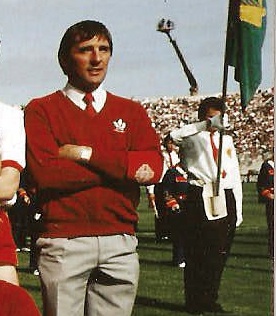
Most of the players from those successful sides have featured at either administrative or coaching levels within clubs, either in Derry or neighbouring counties. A corner forward on that marvellous St Columb’s side was Liam Nelis from Urney. When Tyrone won their first Senior All – Ireland title in 2003 their most able County Chairman was none other than Liam. From a Derry perspective four of them have played pivotal roles in guiding teams to provincial and All – Ireland glory. John Joe Kearney, who also was on the winning All – Ireland U21 side, managed Derry Minors to their third national title in 1989.At club level John Joe was assistant Manager to his native Slaughtneil team which won both the 2014 Derry and Ulster Senior Club championship title and which also reached this year’s All – Ireland Club final only to be beaten by Corofin of Galway. Chris Brown along with Tom Quinn won an All – Ireland Senior club medal with Bellaghy in 1972. In addition to the U21 All – Ireland medal they both won with the County in 1968.Chris was also the successful Manager of Derry Minors when they won their last All – Ireland in 2002.Earlier in 1995 he was the person in charge when Derry were decidedly unlucky to lose the 1995 Minor final to Westmeath.
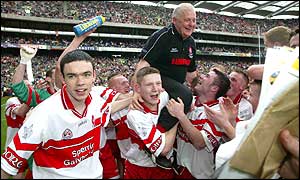
The most phenomenal contribution to Derry football by any member of those 1965 victorious teams has undoubtedly been by Adrian McGuckin. As a player he was on the 1968 successful U21 All – Ireland side and he won three Ulster Senior championship medals in 1970, 1975 and 1976.The Ballinderry man’s coaching and managerial records have been simply outstanding. For 25 years he organised internal structures and devised coaching strategies for the development of Gaelic football in St Patrick’s College Maghera after he took up a teaching position there in 1972. During that period he brought his charges to 13 MacRory Cup finals, winning 11 of them. In addition he led them to 7 Hogan Cup finals, winning three of them in 1989, 1990 and 1995 respectively. It is no wonder that a large majority of the players who won the Senior All – Ireland with Derry in 1993 were coached by Adrian in St Patrick’s. This record is simply incomparable and is vastly ahead of most managerial accomplishments in any sporting discipline anywhere.
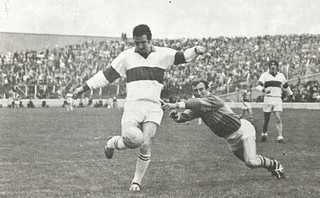
When the plaudits for those heroes of 1965 are being mentioned one man will always take pride of place. Small in stature and big of heart he played a leading role in Derry’s never to be forgotten Senior All – Ireland victory of 1993.Having won an All – Ireland U21 medal in 1968 and an Ulster Senior Championship medal in 1970, Eamonn Coleman turned his attention to managing after he retired as a player. His is an impressive CV. First of all he managed Derry Minors to Ulster success in both 1983 and 1984.In 1983 he led them to victory in the All – Ireland final when they overcame Cork. In 1985 he managed Derry to an U21 victory at provincial level. Early in 1991 he got the call that he really longed for when he was asked to manage the Senior County team. When they won the 1992 League final it was only a matter of time, most learned pundits felt, until Eamonn would deliver the Holy Grail of a Senior All – Ireland title. When that was achieved the following year, in 1993, that Derry side and Eamonn, justifiably, became legends in the history of Derry GAA. (Incidentally Eamonn was also back at the helm when Derry won the 2000 National football league by defeating Meath after a replay.)
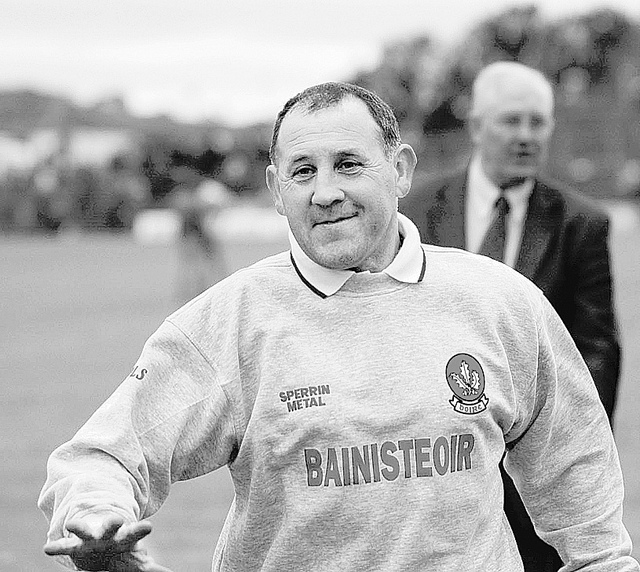
So it can confidently be stated that those All – Ireland victories of 1965, at both College and County level, set the standards for others to equal and indeed surpass. Since that historic breakthrough Derry have won three more All – Ireland Minor titles, two U21 All – Irelands and one Senior All – Ireland. St Patrick’s College Maghera have won 13 MacRory Cups and five Hogan Cups. Three Derry Clubs – Bellaghy, Lavey and Ballinderry – have won provincial and All – Ireland Club titles. Four others – Ballerin, Dungiven, Loup and Slaughtneil have won Ulster Senior Club titles. Individual All Star Awards, International Representative Honours and Railway Cup medals have been awarded to a host of outstanding Derry players. There is no doubt that the achievements of 1965 played a huge, influential role in inspiring Derry teams and Derry players to perform to their full potential. The rich oak seedlings of 1965 have grown into sturdy oak trees in 2015. Let us soon plant some more fruitful seedlings so that a new cycle of hope and eventual success can continue for another fifty years and beyond!
*****
As we arrived back in Riverdale Park East in the Andersonstown area of Belfast, just in time for our breakfast next morning, our genial landlord, the late Ralph Laverty, greeted us with a friendly smile of genuine welcome. As he rushed off to begin another working day as a Master Baker on the Ormeau Road he whispered quietly “it must have been some night!” And so it was. In those innocent days of pure enjoyment I am sure it could safely be said that we were the only students in the whole of Ireland who went to lectures that morning in a car of our own! Physically tired and weary we might have been but none of us would swop that for the sheer happiness that permeated our inner beings. We will be forever grateful to all those associated with those two teams of 1965 for their immense contribution to the GAA in our native County of Derry. However, in the final analysis, the greatest accolades must go to Captain Tommy Diamond and his marvellous team of Minor players. To fully comprehend the totality of what had been achieved I will conclude by quoting the words of a famous local entrepreneur and visionary, Fr Seamus Shields. He will always be fondly remembered not only as one who did so much to encourage indigenous enterprise in an area deprived of so much for so long but also for having a huge input, especially in his role as Chairman of the Derry Minor board, into the organisation of that splendid Minor team. Speaking to the Derry team and supporters at that homecoming in Maghera he said:
“Whether it be at football or anything else, we need to stand on our own two feet. We must lead, not wait to be led. All we need is confidence in our own ability. These Minors have shown us the way…This was more than a football victory. You played the game, you played it hard and you played it clean. You showed sporting standards which made all of us proud of you. You are a credit to the GAA.”
And so say all of us who lovingly recall that memorable day in Croke Park on the last Sunday of September in 1965 and all of us who were in Maghera on the next night – the last Monday of September 1965.
Doire Abú.
*****
St Columb’s College’s victorious 1965 Hogan Cup team lined out as follows in the replayed final:
Joe Cassidy (Derry), Michael Trolan (Ballinascreen), Brendan Dolan (Aghyaran), Michael P. Kelly (Ballinascreen),Colum P.Mullan (Ballerin),Malachy McAfee (Ballerin),Tom Quinn (Bellaghy), Harry McGill (Donemana), Peter Stevenson (Dungiven), Chris Brown (Bellaghy), Paddy McCotter (Capt – Kilrea) ,Tony O’Doherty (Derry), Brendan Mullan (Ballerin),Seamus Lagan (Glen), Liam Nelis (Urney) .
Substitutes:
Colm O’Doherty (Derry}, Kieran McEldowney (Kilrea), Eamonn Small (Glen), Philip Friel (Sarsfields), Sean Mellon (Derry).
N.B. In the drawn game Eamonn Small started at corner forward instead of Liam Nelis and was replaced by Pat McGonagle (Derry)
The Derry Minor team which defeated Kerry in the 1965 All-Ireland Minor final was as follows:
Eugene McCaul (Foreglen), Anthony Burke (Foreglen), Tom Quinn (Bellaghy), Michael P. Kelly (Ballinascreen), Colum P. Mullan (Ballerin), Malachy McAfee (Ballerin), Adrian McGuckin (Ballinderry), Tommy Diamond (Capt – Bellaghy), Seamus Lagan (Glen), Brendan Mullan (Ballerin), Mickey Niblock (Magherafelt), Eamonn Coleman (Ballymaguigan), John Joe Kearney (Slaughtneil), Seamus McCloskey (Foreglen), Phil Friel (Sarsfields).
Substitutes:
George Killen (Slaughtmanus), Sean Moore (Drumsurn), John McGlone (Ballinascreen), Gerry O’Loughlin (Magherafelt), Pat Joe Doris (Ballinderry), Kevin Teague (Moneymore), Michael McGuigan (Ballinascreen), Chris Brown (Bellaghy).
Also included in that successful Minor panel were: Sean O’Hagan (Littlebridge), Philip Mooney (Swatragh), Eddie Boyle (Kilrea), Tommy Harkin (Drumsurn), Noel Henry (Coleraine), and Tommy McKeever (Dungiven).
*****
The 1965 County Minor Panel and Mentors will be honoured at the Ulster Championship games Derry v Down on 7th June at Celtic Park.
An Anniversary Banquet will also be held on that evening in the City Hotel, Derry City at 6.00p.m. This event in the City Hotel is open to anyone who wishes to attend.
Tickets are priced at £30 and can be purchased at the Derry G.A.A. Offices at Owenbeg or by contacting:
Seán Brolcháin e-mail address – sbradley707@googlemail.com
Dónall Scolláin e-mail address – secretary.derry@gaa.ie
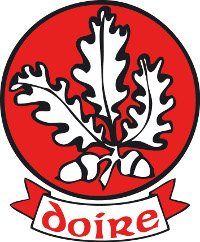
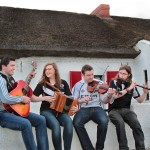
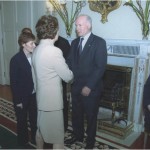
[…] >> Read the full article by Seamus McRory here << […]